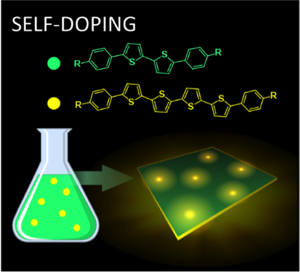Towards brightly luminescent organic crystals: the self-doping concept
Modern light-emitting devices such as top-level TV screens are based on organic luminescent semiconductor materials. The two key requirements for them are efficient luminescence and high charge carrier mobility. The latter requires tight molecular packing readily achieved in organic semiconductor single crystals, but it also results in inhibiting the light emission because of luminescence quenching. This dichotomy is resolved by doping of the host crystals with highly luminescent organic molecules which requires their chemical synthesis and subsequent smooth embedding into the host.

The Optical Condensed Matter Physics group (Zernike Institute for Advanced Materials) together with colleagues from the Lomonosov Moscow State University and the Enikolopov Institute of Synthetic Polymeric Materials (Russian Academy of Sciences) proposed an innovative concept of molecular self-doping. Here, a highly luminescent dopant emerges as a minute-amount byproduct during the host material synthesis, which circumvents the additional synthesis and easies the integration of the dopant into the host crystal lattice. In the promising thiophene-phenylene semiconducting crystals, 1% self-doping doubles the photoluminescence and still maintains the charge transport properties. The time-resolved experiments on photoluminescence dynamics backed by extensive Monte-Carlo modelling reveal the host-dopant energy transfer be mediated by both excitonic transport in the host and host-dopant Förster resonant energy transfer. The self-doping concept opens an easy route to other highly luminescent semiconductor organic crystals for optoelectronics applications.
The results of this work are published in Advanced Functional Materials (O. D. Parashchuk, A. A. Mannanov, V. G. Konstantinov, D. I. Dominskiy, N. M. Surin, O. V. Borshchev, S. A. Ponomarenko, M. S. Pshenichnikov, and D. Yu. Paraschuk, “Molecular self-doping controls luminescence of pure organic single crystals”, Adv. Func. Mat. 2018, DOI: 10.1002adfm.201800116, http://onlinelibrary.wiley.com/doi/10.1002/adfm.201800116/full
For more information please contact Prof. Maxim Pchenitchnikov
| Last modified: | 13 March 2018 4.40 p.m. |
More news
-
24 March 2025
UG 28th in World's Most International Universities 2025 rankings
The University of Groningen has been ranked 28th in the World's Most International Universities 2025 by Times Higher Education. With this, the UG leaves behind institutions such as MIT and Harvard. The 28th place marks an increase of five places: in...
-
05 March 2025
Women in Science
The UG celebrates International Women’s Day with a special photo series: Women in Science.
-
16 December 2024
Jouke de Vries: ‘The University will have to be flexible’
2024 was a festive year for the University of Groningen. In this podcast, Jouke de Vries, the chair of the Executive Board, looks back.
